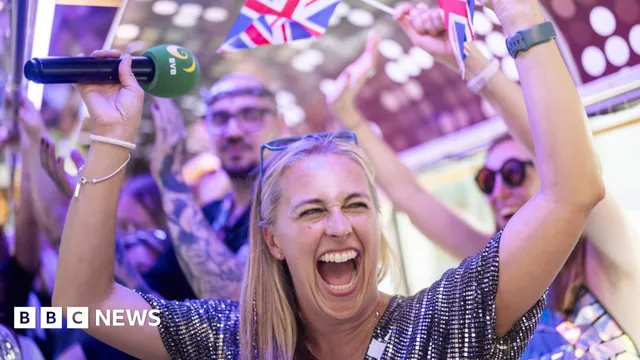
Eurovision grand final features 26 countries competing for the title
2025-05-17 20:24- After semi-final rounds held on May 14 and 16, the lineup for the grand final has been set.
- 26 acts from various countries, including the host Switzerland and the 'Big Five,' will perform.
- The final is expected to be a grand display of cultural diversity, unity, and musical talent.
Express your sentiment!
Insights
Switzerland is hosting the 69th Eurovision Song Contest, which culminates in the grand final held in Basel on May 17, 2025. A total of 37 countries participated in the competition this year, with performers showcasing their talents during semi-final rounds earlier this week, which took place on May 14 and May 16. These semi-finals determined the final 26 contestants through a combination of public voting and automatic qualifications for certain countries, including the host nation and the 'Big Five,' which consists of France, Germany, Italy, Spain, and the United Kingdom. The Eurovision Song Contest is not only a music competition but also a cultural phenomenon that has been running since 1956, intended to unite different nations through a shared appreciation for music. This year’s competition has attracted considerable excitement, featuring various genres and styles, and highlighting the cultural diversity of its participants. The grand final showcases a blend of pop, rock, and other musical forms, with acts from nations such as Norway, Ukraine, and Sweden anticipated to draw significant viewer attention. The importance of this event is underscored by the global fanbase that tunes in from all parts of the world to watch the performances and partake in the voting process. The results of the grand final will be determined by a complex voting system that combines public votes with opinions from music industry juries in each participating country. As a unique characteristic of the competition, viewers cannot vote for their home country’s entry, ensuring a competitive and fair voting system. The anticipation leading up to this moment culminates in a spectacular display of musical talent, dazzling performances, and elaborate stage effects, making it very much akin to a celebration of international pop culture. However, the contest has not been free from controversies, as discussions surrounding Israel’s participation have arisen again this year due to geopolitical tensions. Nevertheless, the Eurovision Song Contest continues to thrive as a platform that celebrates unity despite differences, allowing for the expression of cultural identities through music. As viewers prepare for the final showdown in Basel tonight, there’s a palpable sense of excitement about which nation will take home the highly coveted trophy. In a format akin to the Olympics for music, this event symbolizes a celebration of creativity and community, drawing in millions of fans worldwide.
Contexts
The Eurovision Song Contest (ESC) is one of the longest-running and most celebrated music competitions in the world, first held in 1956. Conceived by the European Broadcasting Union (EBU), its primary goal was to unite European countries through music in the aftermath of World War II. The inaugural contest featured seven participating nations: Belgium, France, Germany, Italy, Luxembourg, Netherlands, and Switzerland, each presenting two songs. Since then, the competition has expanded dramatically, with over 40 countries participating annually, showcasing a diverse array of musical styles, languages, and performances that reflect the rich cultural tapestry of Europe and beyond. The format of the ESC has evolved considerably over the decades. Initially, the competition favored a more straightforward structure, with each country submitting two songs performed by a solo artist or group. However, in 1973, the competition adopted a single entry model, which has persisted to this day. Voting methods have also transformed, moving from a jury-only system to the inclusion of public televoting in 1997, allowing for greater audience engagement and influencing the outcome. This blend of jury and public votes has consequently led to the emergence of unique voting trends, reflecting both regional preferences and the evolving tastes of European audiences. Throughout its history, the ESC has been not only a platform for new musical talents but also a stage for memorable performances. From ABBA's iconic win in 1974 with "Waterloo" to more recent phenomena such as Conchita Wurst's victory in 2014 with "Rise Like a Phoenix," the contest has provided a launching pad for artists who often achieve significant acclaim within the music industry. Additionally, the contest has been a source of advocacy and cultural expression, often addressing social issues such as LGBTQ+ rights and national identity, thus making it a significant event on both the entertainment and political calendar. Looking ahead, the Eurovision Song Contest remains a key fixture in the European cultural landscape, adapting to the times while staying true to its roots of celebrating diversity and unity through music. As it continues to evolve, the ESC must balance maintaining its traditional elements with embracing innovation in technology and audience engagement. As of 2025, preparations for the upcoming editions are already underway, with anticipation building for which new acts will rise to fame and how they will captivate audiences with their creativity and performances. The enduring legacy of the Eurovision Song Contest lies in its ability to foster connection and excitement, bringing together millions of viewers across the globe to share in the joy of music.